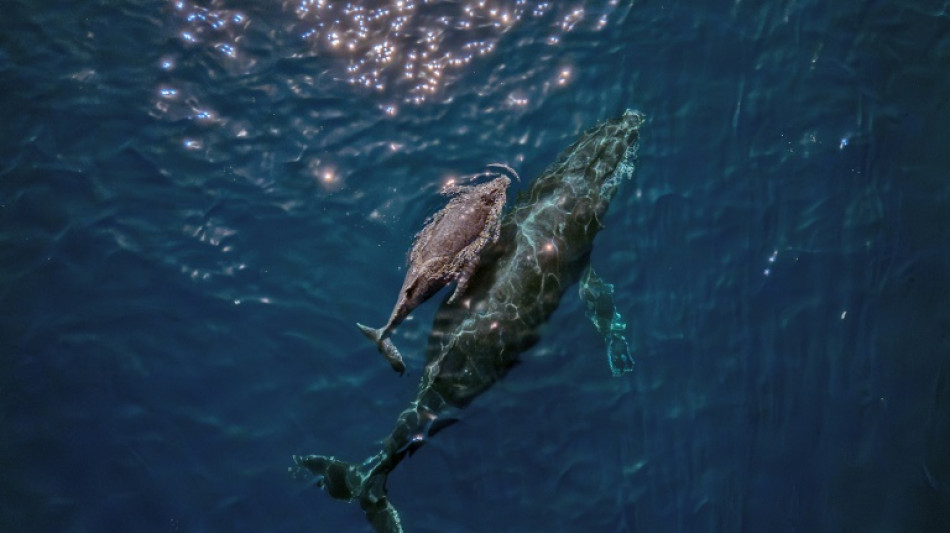
-
 US strikes over 70 IS targets in Syria after attack on troops
US strikes over 70 IS targets in Syria after attack on troops
-
Australian lifeguards fall silent for Bondi Beach victims

-
 Trump's name added to Kennedy Center facade, a day after change
Trump's name added to Kennedy Center facade, a day after change
-
West Indies 206-2, trail by 369, after Duffy's double strike

-
 US strikes Islamic State group in Syria after deadly attack on troops
US strikes Islamic State group in Syria after deadly attack on troops
-
Epstein files opened: famous faces, many blacked-out pages

-
 Ravens face 'special' Patriots clash as playoffs come into focus
Ravens face 'special' Patriots clash as playoffs come into focus
-
Newly released Epstein files: what we know

-
 Musk wins US court appeal of $56 bn Tesla pay package
Musk wins US court appeal of $56 bn Tesla pay package
-
US judge voids murder conviction in Jam Master Jay killing

-
 Trump doesn't rule out war with Venezuela
Trump doesn't rule out war with Venezuela
-
Haller, Aouar out of AFCON, Zambia coach drama

-
 Nasdaq rallies again while yen falls despite BOJ rate hike
Nasdaq rallies again while yen falls despite BOJ rate hike
-
Bologna win shoot-out with Inter to reach Italian Super Cup final

-
 Brandt and Beier send Dortmund second in Bundesliga
Brandt and Beier send Dortmund second in Bundesliga
-
Trump administration begins release of Epstein files

-
 UN Security Council votes to extend DR Congo mission by one year
UN Security Council votes to extend DR Congo mission by one year
-
Family of Angels pitcher, club settle case over 2019 death

-
 US university killer's mystery motive sought after suicide
US university killer's mystery motive sought after suicide
-
Rubio says won't force deal on Ukraine as Europeans join Miami talks

-
 Burkinabe teen behind viral French 'coup' video has no regrets
Burkinabe teen behind viral French 'coup' video has no regrets
-
Brazil court rejects new Bolsonaro appeal against coup conviction

-
 Three-time Grand Slam winner Wawrinka to retire in 2026
Three-time Grand Slam winner Wawrinka to retire in 2026
-
Man Utd can fight for Premier League title in next few years: Amorim

-
 Pandya blitz powers India to T20 series win over South Africa
Pandya blitz powers India to T20 series win over South Africa
-
Misinformation complicated Brown University shooting probe: police

-
 IMF approves $206 mn aid to Sri Lanka after Cyclone Ditwah
IMF approves $206 mn aid to Sri Lanka after Cyclone Ditwah
-
Stocks advance as markets cheer weak inflation

-
 Emery says rising expectations driving red-hot Villa
Emery says rising expectations driving red-hot Villa
-
Three killed in Taipei metro attacks, suspect dead

-
 Seven Colombian soldiers killed in guerrilla attack: army
Seven Colombian soldiers killed in guerrilla attack: army
-
Amorim takes aim at Man Utd youth stars over 'entitlement'

-
 Mercosur meets in Brazil, EU eyes January 12 trade deal
Mercosur meets in Brazil, EU eyes January 12 trade deal
-
US Fed official says no urgency to cut rates, flags distorted data

-
 Rome to charge visitors for access to Trevi Fountain
Rome to charge visitors for access to Trevi Fountain
-
Spurs 'not a quick fix' for under-fire Frank

-
 Poland president accuses Ukraine of not appreciating war support
Poland president accuses Ukraine of not appreciating war support
-
Stocks advance with focus on central banks, tech

-
 Amorim unfazed by 'Free Mainoo' T-shirt ahead of Villa clash
Amorim unfazed by 'Free Mainoo' T-shirt ahead of Villa clash
-
PSG penalty hero Safonov ended Intercontinental win with broken hand

-
 French court rejects Shein suspension
French court rejects Shein suspension
-
'It's so much fun,' says Vonn as she milks her comeback

-
 Moscow intent on pressing on in Ukraine: Putin
Moscow intent on pressing on in Ukraine: Putin
-
UN declares famine over in Gaza, says 'situation remains critical'

-
 Guardiola 'excited' by Man City future, not pondering exit
Guardiola 'excited' by Man City future, not pondering exit
-
Czechs name veteran coach Koubek for World Cup play-offs

-
 PSG penalty hero Safonov out until next year with broken hand
PSG penalty hero Safonov out until next year with broken hand
-
Putin says ball in court of Russia's opponents in Ukraine talks

-
 Czech Zabystran upsets Odermatt to claim Val Gardena super-G
Czech Zabystran upsets Odermatt to claim Val Gardena super-G
-
NGOs fear 'catastrophic impact' of new Israel registration rules


Whales 'cannot out-sing' human noise pollution
Baleen whales have evolved a special voice box to help them to sing underwater -- but this could also make them uniquely vulnerable to being drowned out by human noise pollution, according to new research published Wednesday.
Complex whale melodies, first recorded some 50 years ago, are known to play a key role in the social and reproductive communication of these massive marine mammals.
While toothed whales have a nasal vocal organ, filter-feeding baleen whales use a larynx, although scientists had not figured out exactly how it created the vocalisations.
In a new study published in the journal Nature, a team of scientists in Denmark, Austria, and the United States examined the larynxes of three stranded baleen whales -- the sei, minke, and humpback species -- using scanning and modelling techniques to reconstruct how they produce sound.
They found several differences from land mammals, including a U-shaped structure instead of vocal cords, that allows them to generate their low-frequency songs.
"We've never seen this in any other animal," lead author Coen Elemans, professor of bioacoustics at the University of Southern Denmark, told AFP.
"This is a completely novel adaptation, and we think this allowed these large whales to make sound in the water while basically holding their breath."
But the scientists also found a potentially serious challenge for the whales: the struggle to make themselves heard over noise pollution from ships.
- No escape -
Computer models showed that baleen whale songs can travel long distances through water, but at a maximum depth of 100 metres (330 feet) and at a frequency of up to 300 Hz -- within the range noise made by shipping vessels.
This means that whales in a noisy ocean soundscape are essentially trying to talk across a busy motorway or at a loud party: the further away you are, the less you'll be able to hear, Elemans said.
"It's really sad that baleen whale vocalisations exactly overlap with the sounds we make, predominantly with shipping noise, and there is no way for the whales to sing louder, at a higher frequency, or deeper in the water," Elemans said.
"These animals really can't escape this, and we really need to mitigate the noise we make."
They cannot even dive down to escape the din.
The deeper they go, the greater the pressure which reduces the volume of air available for vocalising, said Joy Reidenberg, a professor at the Icahn School of Medicine at Mount Sinai, who was not involved in the study.
Noise pollution can force whales to change their behaviour, such as remaining silent until quiet returns, moving to another location, or trying to communicate over the noise –- the latter two requiring whales to exert extra energy, potentially weakening their body condition and affecting long-term survival, Reidenberg said.
She said that understanding whale vocalisations could aid conservation efforts by helping understand which depths are "critical habitats".
This is particularly important at mating sites where, depending on the season, noise pollution can disrupt reproduction.
"We must be smarter about when and where we put sound into the water," Reidenberg said.
Researchers say there is an urgent need to regulate underwater noise.
The harm goes beyond whales -- there is evidence that scores of marine species are negatively affected by underwater noise pollution, Melanie Lancaster, senior Arctic species specialist at the World Wildlife Fund, who was not involved in the study, told AFP.
"We know the most about marine mammals, which is why they feature so prominently, yet the impacts are much farther reaching, essentially impacting entire marine ecosystems," she said.
D.Cunningha--AMWN


